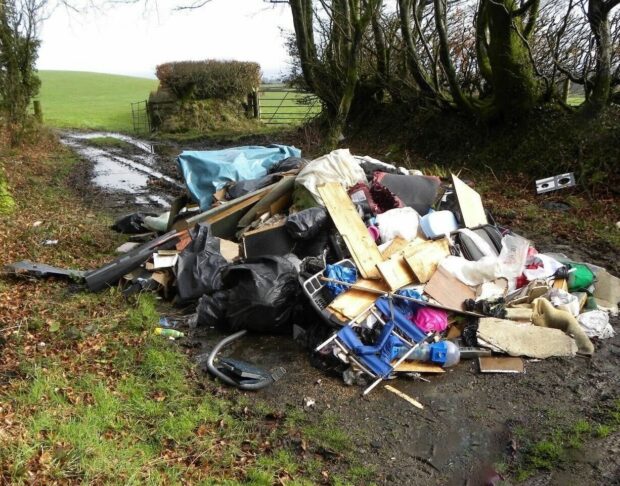
Do you wonder what happens to the rubbish generated in your home once it’s gone?
We all have a responsibility to make sure our waste isn’t fly tipped, doesn’t cause pollution, or harm to people, and this is outlined in the law under the Waste Duty of Care Code of Practice. Most household rubbish gets collected by our local councils as part of their kerbside waste collection services; but what about when you have other – bigger items to dispose of that can’t be put in your bin?
This is when you need to be extra careful to be sure you’re not passing your waste into the hands of someone who does not know what they are doing, or worse, doesn’t care – a waste criminal. These people have no conscience. Their principal aim is to make money, avoiding the environmental regulations put in place to protect our communities, homes, and the greenspaces we and future generations depend on for a healthy, happy life.
These days, it’s easy to search for services online, including on social media. Waste criminals know this and utilise social media and online sales platforms to advertise their bogus waste collection services. It’s seemingly so easy. Say for example, you have an old fridge freezer that needs taking away, but it doesn’t fit in your car, so finding a waste collection service online appears to be the perfect solution. It could be fine, but just to be sure it’s not going to end up dumped in a field, playpark, or country lane, there are three simple checks you should make:
- Visit the public register of waste carriers, brokers and dealers and enter the business name to check they have a valid waste carriers registration.
- Once you know they are registered, ask where they are taking your waste. They should name a legal waste site and you can check the details on the Waste Operations Public Register. You can also ask for a copy of the paperwork confirming they took it there.
- Don’t pay cash. Businesses presenting you with an invoice, including their bank details for bank transfer, are far more likely to be operating legally. Make sure you get a receipt.
It’s not just social media and online sales platforms where you need to be careful. It’s also waste collection mobile apps that act as a platform to connect people who have rubbish to dispose of, with a waste collector. Often those running the waste collection mobile apps make no checks on the waste collection services they advertise and won’t know if your waste has been taken to a legal waste site, despite claiming otherwise.
You might also see adverts in your local paper or community magazines for ‘a man with a van’. Beware of these too and apply the same checks.
Waste criminals can start small on their own with just a van, but they can quickly grow their business resulting in thousands of tonnes of waste being collected and illegally dumped, causing damage to neighbouring communities and our environment. At the worst end, criminal gangs infiltrate the legitimate waste industry, adding waste crime to their list of other offences, including, drug dealing, firearms, fraud, modern day slavery, and human trafficking.
Enough waste is illegally managed every year to fill Wembley Stadium 30 times, costing the economy and the public in England an estimated £1 billion per year. We want to get to a place where no waste is illegally managed, meaning taxpayers money that is currently needed to stop these criminals, can be redirected.
For that to happen, it’s important that we all take action to prevent our rubbish being illegally disposed of.
While we continue to work to influence change in the law to reduce the opportunity for waste crime and find and hold those responsible to account, the simple checks you can make have the potential to lead to big changes with big positive impacts for our environment and the economy.
Next time you need to find a waste collector, or ‘a man with a van’ or hire a skip – remember to check they’re a registered waste carrier before you use them.
Visit gov.uk to find out what to do with all types of household waste: Dispose of household waste - GOV.UK (www.gov.uk)
Dee Naylor
Advisor – Carriers, Brokers & Dealers
Waste and Industry Regulatory Services

5 comments
Comment by Michael Thompson posted on
I note you state 'duty of care code of practice'.
This in fact means nothing will be done, nor the perpetrators jailed for such infringements. If you want to stop tippin, investigate and prosecute law breakers, confiscate there illegal proceeds from such action and jail them. Perhaps this will deter such behaviour. It is just like the pollution in the rivers, money from profits has more support than the general environment and the loss to the public.
Comment by Pascal Farnan posted on
Exactly. This is what we are lacking a strong deterrent
Comment by Ward Chris posted on
What’s the point, you don’t do anything about it, if it’s reported the comment comes back, we don’t have enough evidence!
Comment by Baniel Wick posted on
Awesome reading! It is fascinating how tiny, constant checks—in our daily, systemic, or business activities—can cause significant changes in time. This post is a timely reminder that change need not be so dramatic before it becomes effective. Sometimes, it's really the tiny adjustments that reap the most rewards. Thanks for sharing!
Comment by Malcolm posted on
Licensed taxis and private‑hire vehicles are legally required to display a council‑issued licence plate on the rear of the vehicle. Could a similar system be put in place for vehicles involved with waste management to allow enforcement officers and the public to identify legitimate carriers and suspicious waste movement?